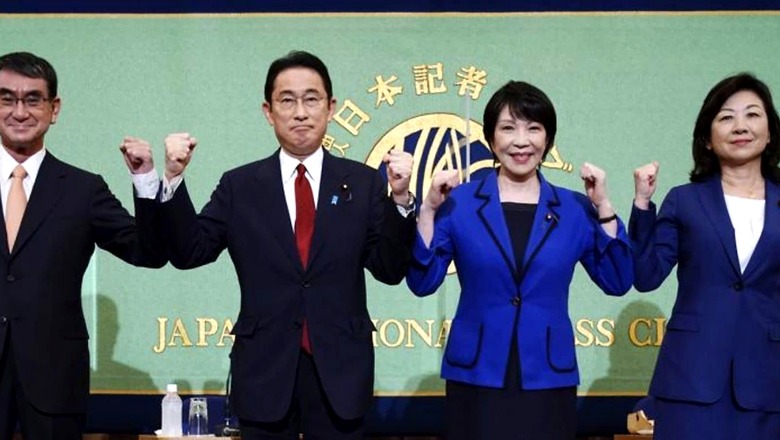
views
Lawmakers in Japan’s ruling party began voting for a new leader and likely next prime minister on Wednesday ahead of a general election due in weeks and with the economy staggering from the COVID-19 pandemic.
The Liberal Democratic Party (LDP) leadership vote seems set to be a showdown between popular vaccine minister Taro Kono and consensus builder Fumio Kishida.
Kono, 58, a U.S.-educated former defence and foreign minister is seen as a maverick but driven by public popularity, while ex-foreign minister Fumio Kishida, 64, is saddled with a bland image but has a stronger support base from party members in parliament.
“I did all I had to do. Next is just to wait for a call,” Kono told reporters, according to Kyodo.
Also running for the top post are former internal affairs minister Sanae Takaichi, 60, an ultra-conservative; and Seiko Noda, 61, from the party’s dwindling liberal wing.
With his support in tatters ahead of the election, Prime Minister Suga surprisingly announced he would step down after only a year as the Liberal Democratic Party (LDP) leader at Wednesday’s vote.
With masks on, the LDP’s parliamentary members, including Suga and former prime minister Shinzo Abe, gathered in the ballroom of a Tokyo hotel to cast their votes from 1:00 p.m. Japan time (0400 GMT). Their ballot box was closed about 30 minutes after they voted in lines.
Rank-and-file party members have been voting for several days. Results from all ballots are scheduled to be announced at 2:20 p.m.
If any candidate gets a clear majority, though projections show it is unlikely, that person will become the winner.
If not, the top two candidates in the first round will immediately go into a run-off vote. The results of the second round of voting are expected around 3:40 p.m.
The new party chief is expected to become the next prime minister as the LDP holds a majority in the parliament’s powerful lower house, but the contest has created political uncertainty in Japan with four candidates.
Last year, LDP factions rallied around Suga after Abe quit following his nearly eight-year tenure, citing ill-health. But Suga’s ratings tanked over his handling of the pandemic, prompting him to announce his departure ahead of a general election that must be held by Nov. 28.
This time, the race to become the country’s next leader is too close to call. Most factions are not unified and votes from rank-and-file members are counted, as opposed to last year.
Kono has the highest numbers in public polls, but Kishida leads among lawmakers, predictions show, as senior party bosses see him more stable.
Grassroot LDP members and rookie lawmakers have emerged as a force in the brief campaign preceding the votes, seen more likely to be swayed by popularity ratings.
But rank-and-file members will have less say in the run-off, as the second-round vote gives greater weight to parliamentarians, potentially boosting Kishida’s chances against Kono.
In case of the run-off, Takaichi, a contender in third, has agreed to support Kishida, Sankei Newspaper reported on Wednesday.
Television network NHK reported that nationwide vote results from rank and file party members so far showed Kono leading at 44%, followed by Kishida with 29%, Takaichi with 19%, and Noda at 8%.
A win by Kono or Kishida is unlikely to trigger a huge shift in policies as Japan seeks to cope with an assertive China and revive an economy hit by the pandemic, but Kono’s push for renewable energy and to remove bureaucratic obstacles to reform have made him appealing to investors and business chiefs.
Takaichi has been more outspoken on hotbutton issues such as acquiring the ability to strike enemy missile launchers. She has also made clear that as premier, she would visit the Yasukuni Shrine for war dead, seen in Beijing and Seoul as a symbol of Japan’s past militarism. Kono has said he would not.
The candidates have also clashed over cultural values, with Kono favouring legal changes to allow and separate surnames for married couples, both anathema to conservatives like Takaichi.
Kono and Kishida have pointed to the failure of Abe’s signature “Abenomics” mix of expansionary fiscal and monetary policies and growth strategy to benefit households but offered few specifics as to how to fix the flaw, while Takaichi has modelled her “Sanaenomics” on her mentor Abe’s plans.
The next prime minister will continue with expansionary economic policy “for at least another year”, as the pandemic has yet to be contained, said Ryutaro Kono, chief Japan economist at BNP Paribas.
Read all the Latest News , Breaking News and IPL 2022 Live Updates here.















Comments
0 comment